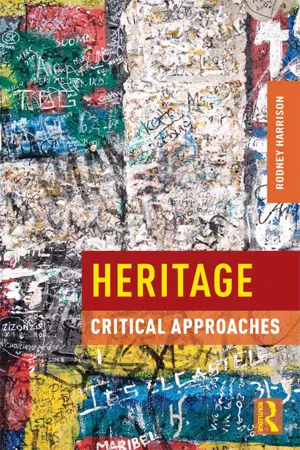
- 272 pages
- English
- ePUB (mobile friendly)
- Available on iOS & Android
About this book
Historic sites, memorials, national parks, museums…we live in an age in which heritage is ever-present. But what does it mean to live amongst the spectral traces of the past, the heterogeneous piling up of historic materials in the present? How did heritage grow from the concern of a handful of enthusiasts and specialists in one part of the world to something which is considered to be universally cherished? And what concepts and approaches are necessary to understanding this global obsession?
Over the decades, since the adoption of the World Heritage Convention, various 'crises' of definition have significantly influenced the ways in which heritage is classified, perceived and managed in contemporary global societies. Taking an interdisciplinary approach to the many tangible and intangible 'things' now defined as heritage, this book attempts simultaneously to account for this global phenomenon and the industry which has grown up around it, as well as to develop a 'toolkit of concepts' with which it might be studied. In doing so, it provides a critical account of the emergence of heritage studies as an interdisciplinary field of academic study. This is presented as part of a broader examination of the function of heritage in late modern societies, with a particular focus on the changes which have resulted from the globalisation of heritage during the late twentieth and early twenty-first centuries.
Developing new theoretical approaches and innovative models for more dialogically democratic heritage decision making processes, Heritage: Critical Approaches unravels the relationship between heritage and the experience of late modernity, whilst reorienting heritage so that it might be more productively connected with other pressing social, economic, political and environmental issues of our time.
Tools to learn more effectively

Saving Books

Keyword Search

Annotating Text

Listen to it instead
Information
Table of contents
- Front Cover
- Half Title
- Title Page
- Copyright
- Contents
- List of figures
- List of tables
- Preface and acknowledgements
- 1 Introduction: Heritage everywhere
- 2 Some definitions: Heritage, modernity, materiality
- 3 Prehistories of World Heritage: The emergence of a concept
- 4 Late-modernity and the heritage boom
- 5 Critical heritage studies and the discursive turn
- 6 Intangible heritage and cultural landscapes
- 7 Heritage, diversity and human rights
- 8 Heritage and the ‘problem’ of memory
- 9 Dialogical heritage and sustainability
- 10 A future for the past?
- Notes
- References
- Index
Frequently asked questions
- Essential is ideal for learners and professionals who enjoy exploring a wide range of subjects. Access the Essential Library with 800,000+ trusted titles and best-sellers across business, personal growth, and the humanities. Includes unlimited reading time and Standard Read Aloud voice.
- Complete: Perfect for advanced learners and researchers needing full, unrestricted access. Unlock 1.4M+ books across hundreds of subjects, including academic and specialized titles. The Complete Plan also includes advanced features like Premium Read Aloud and Research Assistant.
Please note we cannot support devices running on iOS 13 and Android 7 or earlier. Learn more about using the app